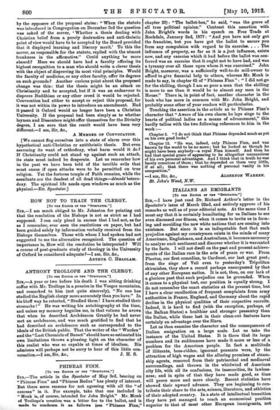PHINEAS FINN.
fTO THE EDITOR OF THE "SPECTATOR."] SIR,—The article in the Spectator of May 3rd, bearing on " Phineas Finn" and "Phineas Redux" has plenty of interest. But there seem reasons for not agreeing with all the " of courses" in it. For example, take that one included in " Monk is, of course, intended for John Bright." Mr. Monk of Trollope's creation was a bitter foe to the ballot, and is made to condemn it as follows (see " Phineas Finn,"
chapter 20) : "The ballot-box," he said, "was the grave of all true political opinion." Contrast this assertion with
John Bright's words in his speech on Free Trade at Rochdale, January 2nd, 1877: "And you have not only got the franchise, but you have got the ballot to secure you from any compulsion with regard to its exercise. . . . The influence of property, so far as it is a just influence, exists now, and any exercise which it had before the ballot was con- ferred was an exercise that it ought not to have had, and was a tyranny over all those upon whom it was exercised." John Bright, moreover, was a sufficiently well-to-do mill-owner to afford to give financial help to others, whereas Mr. Monk is made to say, in chapter 65 of "Phineas Finn" " I did not go for the shilling, though I am so poor a man that the shilling
is more to me than it would be to almost any man in the House." There is, in point of fact, another character in the book who has more in common with Mr. John Bright, and probably some other of your readers will particularize. Touching the assertion in the article as to Phineas Finn's character that "Aware of his own charm he lays siege to the hearts of political ladies as a means of advancement," this hardly tallies with the two following references to him in the work :-
Chapter 5. " I do not think that Phineas depended much as yet on his own good looks."
Chapter 15. "He was, indeed, only Phineas Finn, and was known by the world to be no more ; but he looked as though ho might have been anybody—a royal Finn himself. And then ho had that special grace of appearing to be altogether unconscious of his own personal advantages. And I think that in truth he was barely conscious of them ; that ho depended on them very little, if at all ; that there was nothing of personal vanity in his composition."
St. John's Wood, N.W.










































 Previous page
Previous page